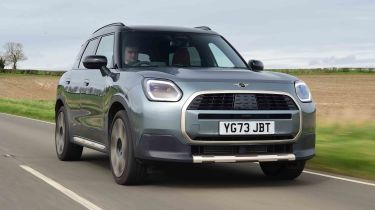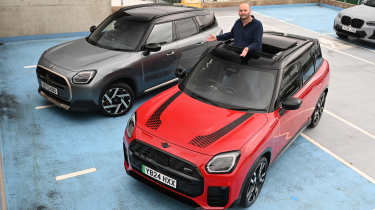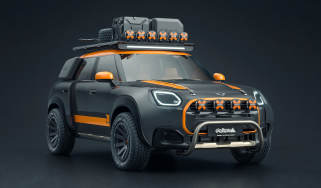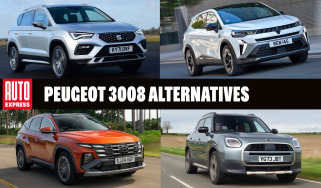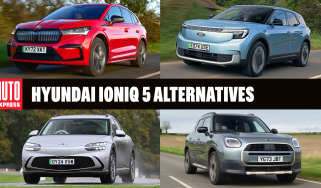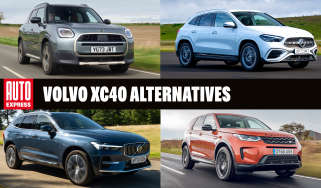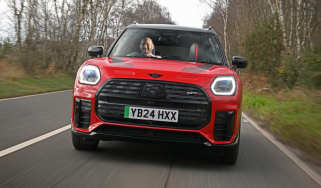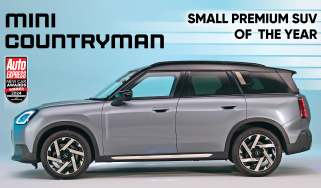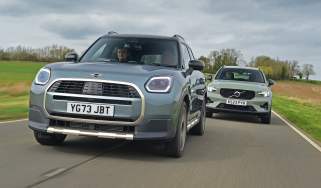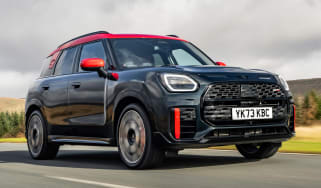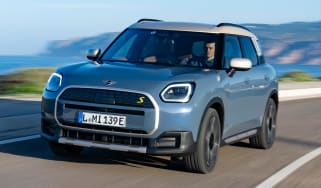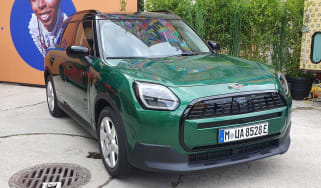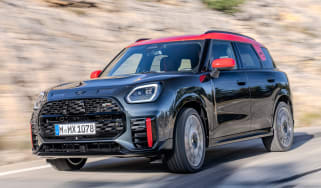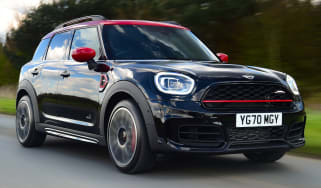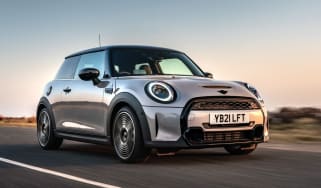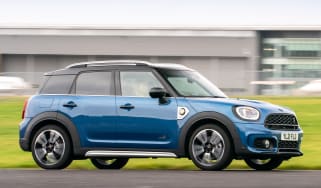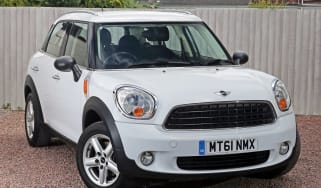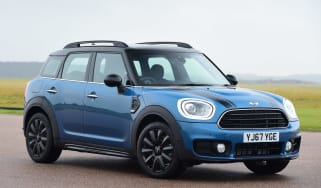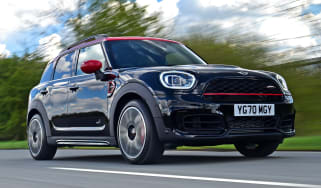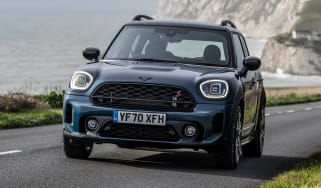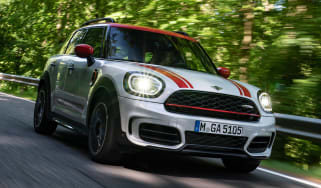MINI Countryman review
The MINI Countryman is the brand’s most convincing SUV to date, with a standout interior and petrol or EV power

Is the MINI Countryman a good car?
The classy interior and high-end technology of the MINI Countryman really help it stand out from its rivals, and it has a cheeky fun character about it that can so often be missing from a family car.
In its latest form, the Countryman has grown over its predecessor, so it now offers genuine practicality, while the optional sliding rear seat boosts flexibility whether you need to transport people or luggage. There’s an affordable petrol version for those with an eye on their bank balance, or an all-electric version for those conscious of their emissions.
| Key specs | |
| Fuel type | Petrol, electric |
| Body style | Five-door small SUV |
| Powertrain | 1.5-litre 3cyl turbocharged petrol, front-wheel drive 2.0-litre 4cyl turbocharged petrol, four-wheel drive 64.7kWh battery, 1x e-motor, front-wheel drive 64.7kWh battery, 2x e-motors, four-wheel drive |
| Safety | 5-star (Euro NCAP, 2024) |
| Warranty | 3yrs, unlimited miles |
How much does the MINI Countryman cost?
Sure, the growth spurt of the latest MINI Countryman may take it further away from the original Mini rationale, but that size increase makes it far more worthwhile to its target audience who are looking for a practical mid-size family SUV. And in keeping with the times, you can get an all-electric version.
The Countryman’s flexible model range starts with an affordable, sub-£30,000 version using a 1.5-litre petrol, followed by a 2.0-litre, which utilises four-wheel drive for those wanting greater traction in slippery conditions at just under £35,000. A high-performance MINI Countryman John Cooper Works (JCW) version for a little over £41,500 competes with rivals like the Cupra Formentor.
Used - available now

2022 Mini
Countryman
23,970 milesAutomaticPetrol1.5L
Cash £21,800
2020 Mini
Countryman
36,210 milesManualPetrol1.5L
Cash £14,399
2016 Mini
Countryman
79,590 milesManualDiesel2.0L
Cash £4,995
2022 Mini
Countryman
28,283 milesManualPetrol1.5L
Cash £16,349The electric MINI Countryman E kicks off at a little over £42,000 and provides around 285 miles of range, while the swifter four-wheel drive SE version costs just over £47,000 and gets 266 miles of range.
There are four trim levels of Countryman to match the MINI Cooper hatch range: Classic, Exclusive, Sport, and JCW. Classic trim includes a heated steering wheel, a rear-view camera, cruise control, and satellite navigation. Exclusive trim has a fuller colour palette, a brighter cabin, and adds larger 18-inch alloys. Sport gets its own mix of body colours, introduces some 19-inch JCW wheels, adaptive suspension, JCW sports front seats and a JCW steering wheel.
Additionally, all trim levels have one of three packs you can add. Level 1 with Classic trim adds adaptive LED headlights with automatic high-beam control, electric folding and dimming side mirrors, heated front seats, a head-up display and a wireless phone charging pad. If you add Level 2 to Classic, then you get everything from Level 1 plus a panoramic glass roof, privacy glass, and an upgraded Harman Kardon sound system.
Engines, performance & drive
| Model | Power | 0-62mph | Top speed |
| MINI Countryman E | 201bhp | 8.6 seconds | 105mph |
| MINI Countryman 1.5 | 168bhp | 8.3 seconds | 131mph |
| MINI Countryman 2.0 JCW | 296bhp | 5.4 seconds | 155mph |
The blurb would like you to believe that the MINI Countryman has ‘go-kart’-like handling, MINI even naming one of the Experience driving modes as such. The reality is far from that, though.
That’s not to say the Countryman doesn’t provide a decent drive. Driven as most people normally would, it offers enough ride comfort and competent, if hardly fun, handling.
What is the MINI Countryman like to drive?
In town
You might think that the larger size of the Countryman might put it at a disadvantage in town, but the tall driving position and relatively short overhangs mean the Countryman is fairly easy to place on the road.
In order to limit body lean, the suspension is a bit on the firm side to keep things controlled, but we wouldn’t suggest it’s uncomfortable. We would say that the quick steering of the Countryman is a little at odds for something this tall, with small inputs causing the car to dart around, making it difficult to place the car in a bend, sometimes leading you to make multiple steering corrections mid-corner. It’s a particular problem with the high-performance JCW version, which tends to tramline across all but the smoothest of surfaces.
Unfortunately, the standard-fit automatic (especially when fitted to the entry-level 168bhp engine) is very hesitant when pulling away, so it’s advisable to give yourself a bigger gap when merging onto a busy roundabout. Alternatively, you could choose the all-electric version, which has snappier responses. Our experience of the four-wheel drive, dual motor SE suggests it has all the punch you’d need to nip out of junctions around town, or squirt between corners on a fast country road.
On A- and B-roads
Country roads are generally a good fit for the smaller models in the MINI range, but this isn’t the case for the bigger Countryman – even if you try its sharpest Go Kart mode that comes as part of the eight ‘Experiences’ available.
The automatic gearbox used in petrol versions can actively hamper your fun, too. While its shifts are smooth and it is responsive enough (once on the move), the lack of manual controls on the gear lever or steering wheel paddles in non-Sport versions means you have little say over which forward gear the gearbox is in, robbing you of some control and putting you at the mercy of the car’s electronics.
We’d also like to see a more settled ride on JCW models. Despite having adaptive suspension (also provided as standard on Sport trim), the ride on the JCW with its larger wheel sizes (19- or 20-inches) tends to bounce you from bump to bump and never settles, no matter the speed. The chassis can’t quite keep up with your inputs – intentional or otherwise – at the wheel, so it feels as if it's getting out of shape rather drastically, even if you’re not pushing the car all that hard.
On the motorway
While the Countryman suffers from a little wind noise around the door mirrors at speed, it isn’t so great that it becomes annoying or can’t be drowned out by the sound system. The ride is still firm, but ultimately more forgiving at higher speeds than it is when trundling around town.
Engines, 0-62mph acceleration and top speed
Despite having the least power, the 168bhp 1.5-litre three-cylinder turbo manages to get the MINI Countryman from 0-62mph dash in a respectable 8.3 seconds, while the four-wheel drive 215bhp 2.0-litre four-cylinder turbo cuts this down to 7.1 seconds. The fastest Countryman is the John Cooper Works (JCW), with a very healthy 296bhp that’s also deployed through each of the four wheels to give a 5.4-second sprint time.
We shouldn’t discount the electric versions, though. The two-wheel drive 201bhp E will get to 62mph in 8.6 seconds, while the four-wheel drive 309bhp SE takes 5.6 seconds.
MPG, emissions & running costs
| Model | MPG | CO2 | Insurance group |
| MINI Countryman 1.5 C Classic | 47.9mpg | 134g/km | 20E |
| MINI Countryman 2.0 ALL4 S Classic | 39.7mpg | 149g/km | 25E |
| MINI Countryman 2.0 ALL4 JCW | 35.3mpg | 180g/km | 30E |
Fuel economy for the petrol MINI Countryman, on-paper, is decent rather than class-leading, with the most efficient 1.5-litre getting 47.9mpg and emissions of 134g/km. The 2.0-litre ALL4 manages 39.7mpg and emits 149g/km because the additional weight of its four-wheel drive system hurts efficiency.
The high-performance JCW model has the worst fuel economy and emissions of the Countryman range, with 35.3mpg and 180g/km of CO2.
Electric range, battery life and charge time
| Model | Battery size | Range | Insurance group |
| MINI Countryman E | 63.78kWh (useable) | 285 miles | 23E |
| MINI Countryman SE AWD | 63.78kWh (useable) | 266 miles | 31E |
The MINI Countryman is available with an all-electric version now, an upgrade on the previous model that only had a plug-in hybrid option. That means a much larger 66.45kWh (63.78kWh useable) battery pack that can offer up to 285 miles of range for a two-wheel drive Classic model, or 266 miles for a more potent four-wheel drive version, which is competitive with the BMW iX1.
Using a 7.4kW home wallbox charger, it’ll take around 10 hours to fully recharge a Countryman, while a 10-80 per cent top up from a rapid charger will take around 30 minutes. A 130kW maximum charging speed is again competitive, but there are similarly priced EVs out there, like the Hyundai Ioniq 5, that’ll charge much faster.
Tax
The electric MINI Countryman will be the most appealing to company car drivers because these versions will sit in a much lower Benefit-in-Kind (BiK) tax bracket than the petrol model. The most efficient 1.5 petrol is in the 31 per cent bracket, rising to 34 per cent for the 2.0-litre four-wheel drive model. The JCW sits in the highest 37 per cent tax bracket.
The electric Countryman will be free of road tax (VED) because it has zero tailpipe emissions and can be driven into the London Congestion Charge zone for nothing, although that will change in 2025.
Most versions of the petrol MINI Countryman cost less than £40,000 when new and avoid the luxury car surcharge applied to expensive cars. Just be careful with the options list, because some pricey packs can send the price way over this limit.
Insurance groups
Insurance costs for the MINI Countryman should be reasonable considering they start in group 20 for the entry-level 1.5 Classic, and rise to group 30 for the quickest JCW model. Even the electric version is comparable with the regular petrol version, starting in group 23 for the least powerful E model, and ending in group 31 for the quicker SE four-wheel drive. That’s a few groups lower than the BMW iX1.
Depreciation
According to our expert data, the MINI Countryman maintains a decent amount of its resale value after three years or 36,000 miles, whether you go for a petrol or electric version.
The petrol maintains between 48 and 53 per cent of its value after three years, with the worst model being the 2.0-litre ALL4 Cooper S Exclusive (Level 3), and the best being the electric four-wheel drive SE Classic.
To get an accurate valuation of a MINI Countryman, check out our free car valuation tool
Design, interior & technology
While the MINI Countryman has grown in size and has gained some Land Rover Defender-esque trim squares on the C-pillars, it still retains the floating roof look, large grille and black wheel arch trim of the previous Countryman.
What is the MINI Countryman like inside?
There are four neat-looking vertical air vents across the dash, but the centrepiece is literally the 10-inch diameter central touchscreen display. Not only is it large, but the use of OLED technology means it has some of the sharpest graphics offered in any car.
The use of a central screen means you don’t get a driver’s instrument cluster displaying your speed within your line of sight, although that is a trait that dates back to the very first MINI. Things have moved on a lot since then, which is why we’d suggest you select the Level 1 pack at the very least to give you a heads-up display, which projects navigation and speed onto a small perspex screen near the base of the windscreen, allowing you to see this important information without having to glance away from the road.
What is the interior quality like?
Inside the Countryman you’ll find a decluttered design that, on mid-range Exclusive trim, utilises a large amount of fabric to cover the dashboard, creating a much more welcoming look when compared with the grained soft-touch materials usually used for car interiors.
Sat-nav, stereo and infotainment
Every version of MINI Countryman comes with the same-size infotainment screen that includes the usual Apple CarPlay and Android Auto (although they are only displayed in the centre part of the screen), sat-nav, plus an on-screen assistant called ‘Spike’, a canine who can help you use the car’s various functions.
You may love or loathe that latter feature, but it reflects the times that the brand is utilising the digital world to maintain the sense of humour and fun we’ve come to expect from MINI. The screen has a staggering scope for customisation with its ‘Experience Modes’, although we anticipate that bored children with nothing to do will find more use for this gimmick than an owner who’ll just pick a display style they like and stick with it.
The screen incorporates some games, which are likely to be more useful in the electric version while waiting for the car to charge. The designers of the rally game missed a trick by opting for Toyota Celica replicas instead of original Monte Carlo Rally-winning Minis—one for the mid-life refresh, we think.
If you choose the Level 1 pack, you’ll gain a wireless smartphone charging pad, while paying more for Level 2 will upgrade the standard audio system to a 12-speaker, 365-watt surround sound system from Harman Kardon.
Boot space, comfort & practicality
| Dimensions | |
| Length | 4,444mm (4,445mm E and SE electric) |
| Width | 1,843mm |
| Height | 1,661mm (1,635mm E and SE electric) |
| Number of seats | 5 |
| Boot space | 450-1,450 litres (460-1,450 litres E and SE electric) |
While traditionalists may moan about the MINI Countryman using the brand name synonymous with small cars for a chunky SUV, buyers of this type of car will be pleased about this five-seat versatility, making it a much more practical proposition than the brand’s smallest MINI Cooper supermini.
LED headlights are standard, but the Level 1 pack includes more advanced adaptive headlights to improve visibility at night without dazzling oncoming traffic. Parking sensors are included all around, as well as a reversing camera.
Dimensions and size
At 4,444mm long, the MINI Countryman is around 100mm longer than its predecessor and is now longer than the Volvo XC40. The Countryman isn’t quite as wide as the XC40 (1,843mm versus 1,910mm), but it is taller, at 1,661mm versus 1,657mm.
How practical is the MINI Countryman?
Seats & space in the front
There are a few traits of other MINI models in the Countryman, such as the windscreen that seems more upright than those of rivals, along with chunky front pillars that you’ll have to look around when navigating roundabouts or pulling out of junctions. There’s a decent amount of adjustability in the driving position, but in order to get lumbar controls, you’ll need to add the Level 3 pack to the mid-range Exclusive trim. Doing so gets you electric seat adjustment with a driver’s side memory function.
Seats & space in the back
Parents looking to use the MINI Countryman as a family car will be pleased to find that it's a genuinely roomy car, with lots of elbow room in the back in order to carry three people abreast. That middle seat occupant will also find a dedicated cut-out beneath the central console to give them somewhere to put their feet.
The rear backrest can be made to recline in order to increase passenger comfort, while adding any one of the ‘Level’ packs to mid-range Exclusive gives you a sliding rear seat that you can use to increase leg room for those in the second row.
There’s an ISOFIX child seat mounting point on the front passenger seat and two more points located on the outer positions of the rear bench.
Boot space
A 450-litre boot in the MINI Countryman means it should have plenty of space for five people’s luggage. The cargo area is square with flat sides, making it easy to pack, and the floor is only slightly below the boot entrance, meaning there isn’t an awkward lip to lift items over. Lift the false boot floor and there’s a deep hidden storage compartment beneath.
If you need even more capacity, you can drop the flexible 40:20:40 split rear seat backs for up to 1,450 litres of space. A powered tailgate is standard.
As mentioned in the previous section, adding the Level 1 pack to the mid-range Exclusive trim allows you to get a sliding rear bench seat to increase boot space if you don’t have anyone tall in the back. The seats slide in a 60/40 split, which means they don’t all move individually from one another, unlike the seat backs.
Safety & reliability
It’s too soon to say how the latest MINI Countryman will perform in our Driver Power owner-satisfaction survey, but the MINI brand dropped five places from its 2023 score, down to 20th out of 32 manufacturers for the 2024 rankings. While that does put it ahead of fellow premium small SUV manufacturers such as Mercedes and Volkswagen, it has fallen behind Volvo and BMW.
Safety experts Euro NCAP awarded the latest MINI Countryman five stars out of five for safety after it was tested in 2024. It matched the Volkswagen Tiguan for adult occupant protection and beat its rival in terms of its safety assistance technology, but the Tiguan is ahead for child occupant and vulnerable road user protection.
As with most small SUVs, the Countryman has plenty of the latest safety assistance tech, from autonomous emergency braking (AEB) to help prevent or mitigate low-speed collisions with pedestrians and other vehicles, to blind spot monitoring to warn you of other vehicles alongside you on the motorway when you go to change lanes. Adaptive cruise control comes with the Level 1 pack, while the Level 3 pack on higher trim Exclusive models and above works at a higher speed and also incorporates a lane change assist function for use on dual-carriageways and motorways.
| Key standard safety features | Euro NCAP safety ratings |
|
Warranty
A three-year manufacturer’s warranty period for the MINI Countryman isn’t particularly spectacular, but it does at least have an unlimited mileage policy, which is a step ahead of most rivals.
The electric E and SE models have a separate eight-year or 100,000-mile warranty for the battery pack, which guarantees that its capacity won’t drop below 70 per cent state of charge during the warranty period. If it does, the pack will be replaced.
Servicing
You can purchase an inclusive service package when ordering a MINI Countryman, starting from a little under £400 or around £10 per month to cover electric versions for four years' worth of servicing, or a little over £1,000 (£1,100 for JCW models) or £14 per month for petrol and plug-in hybrid models.
When your MINI needs to be serviced, you’ll be notified either by message in the car or via your app log-in.
MINI Countryman alternatives
While the old Countryman was available only with petrol, diesel and plug-in hybrid powertrains, this version makes full use of the BMW Group’s UKL2 platform. This means you can get a petrol version to challenge the likes of the BMW X1 and BMW X2 (both of which use the same underpinnings), Range Rover Evoque, and Volvo XC40, while the electric version does battle with other similarly sized EVs like the Audi Q4 e-tron, BMW iX1, Hyundai Ioniq 5, Kia EV6, Mercedes EQA, and Volvo EX40.
The MINI Countryman's strengths lay in it being a practical family SUV with some useful practicality touches and a knock-out interior that lifts it above its humdrum rivals. It’s keenly priced for a desirable premium mid-size SUV, and comes with a decent amount of useful safety assistance technology as standard.
We’d go for a mid-range Exclusive version because not only can you get it in more interesting colours, but adding our recommended Level 2 pack gives a more advanced Driving Assistance Plus package and the flexibility of sliding rear seats, so you can stick taller people in the back when you don’t need the boot space, or slide them forward when you need to fit everything in on an IKEA run.
We’ve opted to keep the price down and stick with the 1.5-litre petrol, but if you want something smoother with a less laggy gearbox, then the Volvo XC40 might fit the bill. The electric version of the Countryman has a decent range, but there are similarly priced alternatives with greater range and charging speeds, such as the Hyundai Ioniq 5 or Kia EV6
MINI Countryman long-term test
Creative director, Darren Wilson, has run both petrol and electric versions of the MINI Countryman. He’s enjoyed the easy-to-use infotainment system, while his children love its interactive features. The Countryman has proven to be a practical family car, with a boot big enough to tackle a trip to the DIY store. Darren was less taken with the hesitancy of the petrol version, but that issue was solved by going for the more responsive electric alternative. You can read the full long-term test here…
